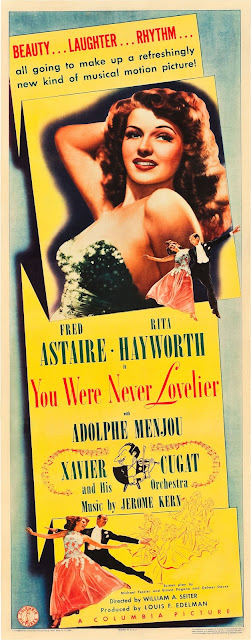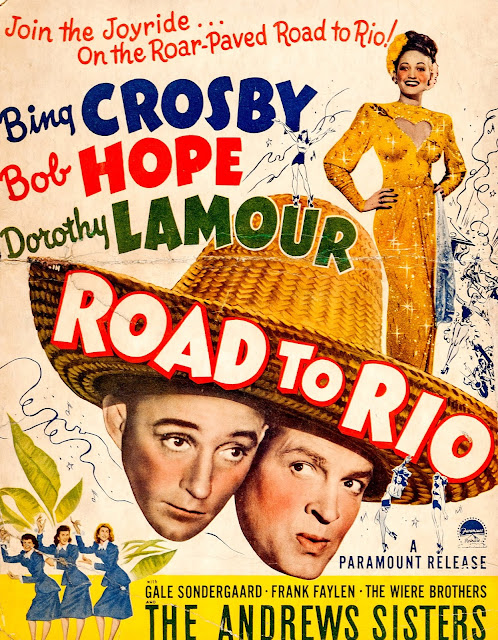"My little pal Gallagher": Platinum Blonde (1931)
When I heard about Platinum
Blonde, I was intrigued. Jean Harlow directed by Frank Capra in a pre-Code
comedy? Yes, please! But then I actually saw the film. I was expecting Harlow
to be her typical self—brassy, seductive, funny, gorgeous… So, I was confused
when it turned out that Jean wasn’t the down-to-earth newswoman pining for her
oblivious co-worker, but rather Loretta Young was. Huh? A quick look online
told me why: the film began as a vehicle for star Young, but as production went
on, the studio realized what a great talent this Harlow girl was, so the film
was shifted towards her. It makes sense in theory, but the movie didn’t quite
recover from it. Let me explain… (Also, I apologize for the quality of the photos. I couldn't find what I wanted online, and my only way of getting them was to take pictures of my TV's images with my phone. I had to make the photos small, too, so they would fit the layout I wanted them to. Again, so sorry.)
Platinum Blonde
is a very predictable story once you get the set-up. Robert Williams plays Stew
Smith, a reporter who likes to goof around with his best friend, Gallagher (Young),
rather than write stories. Stew is tasked with getting the dirt on a scandal
involving a chorus girl and the wealthy Michael Schuyler. Ann Schuyler (Harlow)
tries to flirt with Stew so as to keep him from exposing her brother, but Stew
does it anyway. He’s interested in Ann, though, so he starts pursuing her.
Within a month they’re married, upsetting her wealthy family and breaking poor
Gallagher’s heart. Ann assures her family that she can make Stew part of the
upper-crust—she basically married him to make him a pet project of hers.
Naturally, Stew resists and Ann insists. He gradually keeps
losing, and things only get more strained between the two when Ann meets
Gallagher and realizes that her husband’s best bud is actually a beautiful
woman, something Stew admits he didn’t think about because he considers
Gallagher one of the guys. Things eventually reach the point where Stew can’t
take anymore and he decides to leave Ann. Gallagher fully supports him, leading
Stew to finally see that he should have been with her the whole time.
The script offers little new insight into the clichéd plot. It might have been saved had it provided solid jokes, but the film fails there most of the time. Robert Williams is good as Stew, but he can get annoying quickly. He tries to be funny, but that’s part of the problem—I shouldn’t be able to see him try. One of the biggest problems of Platinum Blonde is that too much time is spent with Williams. He starts to come off as too arrogant and obnoxious. A scene would start off nice enough, but then it starts to drag on. Case in point: Stew finds himself alone in the house one night after begging off one of Ann's many high-society parties. He's bored, so he plays hopscotch by himself in the foyer. It's funny, and when he starts to talk to the butler, it stays funny. But then he keeps talking to the butler and I start to lose interest.
The script offers little new insight into the clichéd plot. It might have been saved had it provided solid jokes, but the film fails there most of the time. Robert Williams is good as Stew, but he can get annoying quickly. He tries to be funny, but that’s part of the problem—I shouldn’t be able to see him try. One of the biggest problems of Platinum Blonde is that too much time is spent with Williams. He starts to come off as too arrogant and obnoxious. A scene would start off nice enough, but then it starts to drag on. Case in point: Stew finds himself alone in the house one night after begging off one of Ann's many high-society parties. He's bored, so he plays hopscotch by himself in the foyer. It's funny, and when he starts to talk to the butler, it stays funny. But then he keeps talking to the butler and I start to lose interest.
However, his scenes with Loretta Young are great
and he does well with Harlow. One particular scene with Harlow is a bit of a
surprise because it feels so spontaneous and fresh. Ann wants Stew to wear sock
garters, an item that Stew has professed from the beginning that he will never
wear because it’s a symbol of something he’s not. They become playful and soon
they’re speaking to the rhythm of “The Farmer in the Dale” (you’ve heard it
before). They laugh and snuggle, which helps to show how Stew could
marry someone who otherwise acts coldly. You can actually watch the scene here.
That brings me to another problem with Platinum Blonde. I understand that it was early in Harlow’s career,
but it’s still weird seeing her be so snobby. Her moments of warmth, such as
the singing scene, are her best. However, they contradict the rest of her
character, I think. She’s not exactly a one-dimensional character, but she’s
certainly not a three-dimensional one either. Ann is selfish, cold, and snooty,
so when she cuddles with Stew, you’re thrown off. It doesn’t seem like Ann is
putting on an act, so what’s the deal? This is what I meant earlier when I said
the film suffers from focusing away from Loretta Young. Harlow gets more screen
time, sure, but her character doesn’t exactly deserve given the material she
has. If she were more fleshed out, I could understand it.
Honestly, it was unfair to steer away from Young’s character. Gallagher actually interested me, and I would’ve loved to have seen more. Young played her without resulting to unbearable self-pity or cloying innocence. Gal loves Stew, but you get the feeling that she’s waiting for him to grow up a little. She just has too few scenes. The picture’s title was actually supposed to be Gallagher, but once again, to fit Harlow it was changed to Platinum Blonde. In my opinion, the original title would have been more fitting. Young still retained first billing, though, which is weird once you see how small her part is compared to everyone else’s.
Young and Williams had chemistry, too. Two of their scenes
were the most enjoyable parts of the movie to me. At one point, Stew calls Gal
just to chat. They’re so relaxed and comfortable with each other, plus Young looks
amazing in her shots. The other scene is after Ann and Gal have met at a swanky
party the Shuylers are throwing, and Stew seems to see his best friend for the
first time once Ann calls his attention to the fact that Gal is gorgeous. Their
bodies are so close together as they talk: “Well, well. My little pal Gallagher
is a gal, huh? [kisses her hand] That’s just to give you the idea that I know
how to treat a gal.” Trust me, it’s more tender than I make it sound.
The best part of Platinum
Blonde, though, is the visuals. I was constantly surprised at how beautiful
and interesting the film looked. I love Frank Capra, but nothing about this
picture felt like him. Well, almost nothing. The class struggle is very much a
theme Capra liked to explore. When Stew insists that his valet let him put his
own shoes on, I was instantly reminded of Mr.
Deeds Goes to Town. But the angles and lighting of Platinum Blonde were so different from what I expect of Capra. The fourth image below comes from this clip when Gal and Ann meet, and I highly recommend you watch it just to fully appreciate the shots and the great lighting. Young and Harlow are literally luminous.
I was so ready to love this film, but by the end of it, I kept thinking about what it could’ve been. It had to be the most innocent pre-Code I had ever seen. It’s unfortunate that the filmmakers didn’t stick with their original plan and focus on Young, but maybe Harlow’s career would have suffered from it—who knows? Critics at the time agreed that it was weird that the top-billed Young was pretty much left out, but they still enjoyed Harlow’s performance. Sadly, Williams died just four days after the movie’s bi-coastal premiere on November 3rd, 1931. He had taken a vacation to Catalina Island and was suddenly struck with appendicitis, which then became peritonitis.
Despite my disappointment with Platinum Blonde, I’d still recommend it, if only for the visuals.
Maybe I’m being too harsh on it because I was expecting one thing and got
something completely different. Anyone else who’s seen the film, feel free to
correct me. Make me like the film, I implore you.
With love,
Michaela

























Hello !
ReplyDeleteI've watched the film and I love it ! You're right on many points though, and I think it's just a matter of expectations and impressions.
I remember very well I waited to be interested by both actresses before watching the movie and not be disappointed, and I did well. It did'nt bother me to have the story "split" like that between Young and Harlow, but I can understand you could want more of Young (and I had quite a crush on her after watching the movie, just saying^^). However I liked the opposition between both couples, and I liked the fact Harlow was not the kind of charachter she used to play.
That being said, of course you have the right not to love this movie ("chacun ses goûts !" ^^), and I understand what you mean by "I'm disappointed beacause I was expecting one thing and got something completely different", I had the same feeling with The Lady Eve (with Barbara Stanwyck, who is... genius) : you expect one thing, it will be great, and... no you have another thing you can't accept, arghhh ;)
Bye !
Laurent
I'm sure this film will be one of those I'll watch in a few years and go, "Why did I not love this?!" It definitely has all the right things going for it with its cast, director, and cinematographer. I can see why you would love it. It took me awhile to warm up to The Lady Eve myself...but like Henry Fonda's character, Stanwyck finally got me.
DeleteÀ bientôt!
This comment has been removed by the author.
ReplyDelete